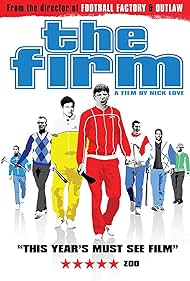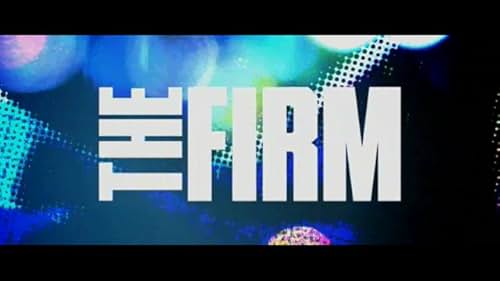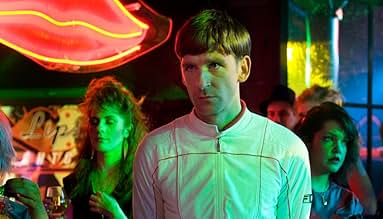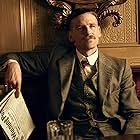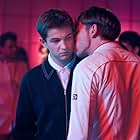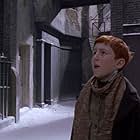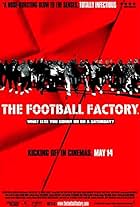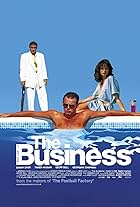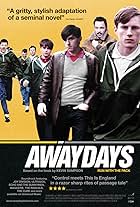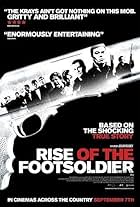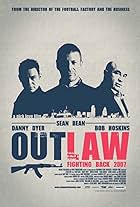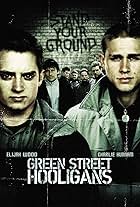The Firm
- 2009
- 1h 30min
VALUTAZIONE IMDb
5,8/10
6531
LA TUA VALUTAZIONE
Aggiungi una trama nella tua linguaFootball hooligans organize themselves into firms that represent their favorite team.Football hooligans organize themselves into firms that represent their favorite team.Football hooligans organize themselves into firms that represent their favorite team.
- Regia
- Sceneggiatura
- Star
Trama
Lo sapevi?
- QuizBex's estate agents is called Hunter Ashton & Clarke. Which is a nod to both the writer and the director of the 1989 original movie.
- BlooperThey boys are seen at various times going into JD Sports, the film is set in 1983, JD Sports didn't open a shop in London until 1989.
- Citazioni
Bex: [Terry bumps into Bex on the dance floor] Whoa. Sorry mate.
Terry: It's alright mate. Teach you to dance like a fucking melt though, won't it?
Bex: Slow down. I'm just cutting a rug with me wife.
Terry: [Terry looks at Bex' wife] What, that?
Bex: No, you don't wanna make one with me mate. I'll fucking leave you behind.
- Curiosità sui creditiDedication listed in end credits: "This film is dedicated to Lordy."
- ConnessioniFeatured in Angela and Friends: Episodio #1.54 (2010)
Recensione in evidenza
Nick Love's films are not about football violence, they are about men. They ask the question, how do boys become men in a world where the men around them are dysfunctional, often abused and abusive, or in the case of our public figures, corrupt? His films often use the back drop of the football tribe (gang), where it is understood, you can at once lose yourself and find an instant identity, but at what cost? The men in Nick Loves films are always flawed & struggling to find their place in a world that regards their attitude and energies as irrelevant, and as a result they are drawn, by the perceived excitement and glamour, into the bosom of the street gang.
At the core of many of our social ills are dysfunctional men, failing themselves & us on a daily basis. This self hatred, often intensified by drink or drugs, is channelled back at society in many forms, often violent. Nick Love's films open up this world of male adversarial culture and expose it to the sun light. With an uncompromising swagger and flare, he addresses often distasteful issues that are very present, to a greater or lesser degree, all around us and many young men have to face on a daily basis. In fact one of the reasons Nick Loves films manage to gain finance, is that he is always aware of his audience and as a result has built a loyal following that feel understood by a British film maker.
It is lazy not to understand the themes Nick Love is trying to explore, and too easy to join the band wagon of criticism, which in many ways mimics the criticism boys & men face through out their life, as their energies are misunderstood. Far better to welcome the maturing of a talent, and to support and celebrate a British film maker, who is still managing to use the canvas of film to explore themes that are universal, and as relevant today as they were in the 1980s.
Nick Love however, is not Alan Clarke and his subjects, although similar, are very different. Alan Clarke's main thesis was political and his original film was written in a time that saw the working class being remodelled along Thatcherite principles. Clarke & Hunter perceived the football 'thugs' as an extension of the selfish yuppie, that became detached from the traditional community and was looking for a home and found football. While it cannot be denied that the political pressures and unrest of the Thatcher period were profound, and gave rise to a number of dispossessed subcultures, Nick Love's film operates in a world of the personal, not political. His film feels written from the inside out, not the other way round. Gone are the endless scenes debating the rights and wrongs of football violence, which felt heavy with the hand of the filmmaker, and in comes a confident understanding of the world of the story. Free from this pressure to explain the terms of the genre, Love's film becomes about belonging, about the excitement and rituals of the tribe. Whether thematically this is better or worse is one of personal preference, suffice to say, it would have been deeply misguided for Love to have attempted to voice Clarkes themes, which although potent, feel redundant from this point in history.
One could argue that Clarke & Hunters original film failed to fully understand the subculture they used as their political vehicle. In one of the final scenes of the original 'Firm', a minor characters says to a documentary crew,''..its not about the football, we would organize around darts if we could'' .. this has been shown through study to be incorrect. No other sport has thrown up such a subculture as 'Football Hooligans'. It is tribal and deeply rooted, as in the case of Milwall & West Ham, in years and years of territorial and geographical rivalry. Football violence existed long before Clarke or Love, what happened in the 1980s, is it became highly organized, and as Love correctly identifies in his film, it became 'fashionable'. Nick Love's 'The Firm' understands this and in many ways is a truer representation of this phenomenon.
There are a handful of British film makers working today, that are able to explore issues which go to the heart of our culture, within a global multiplex environment . Like it or loath it, Nick Love reaches out and provides a voice to a disaffected , often working class audience, and does this against enormous odds, not least, the middle class critical establishment.
At the core of many of our social ills are dysfunctional men, failing themselves & us on a daily basis. This self hatred, often intensified by drink or drugs, is channelled back at society in many forms, often violent. Nick Love's films open up this world of male adversarial culture and expose it to the sun light. With an uncompromising swagger and flare, he addresses often distasteful issues that are very present, to a greater or lesser degree, all around us and many young men have to face on a daily basis. In fact one of the reasons Nick Loves films manage to gain finance, is that he is always aware of his audience and as a result has built a loyal following that feel understood by a British film maker.
It is lazy not to understand the themes Nick Love is trying to explore, and too easy to join the band wagon of criticism, which in many ways mimics the criticism boys & men face through out their life, as their energies are misunderstood. Far better to welcome the maturing of a talent, and to support and celebrate a British film maker, who is still managing to use the canvas of film to explore themes that are universal, and as relevant today as they were in the 1980s.
Nick Love however, is not Alan Clarke and his subjects, although similar, are very different. Alan Clarke's main thesis was political and his original film was written in a time that saw the working class being remodelled along Thatcherite principles. Clarke & Hunter perceived the football 'thugs' as an extension of the selfish yuppie, that became detached from the traditional community and was looking for a home and found football. While it cannot be denied that the political pressures and unrest of the Thatcher period were profound, and gave rise to a number of dispossessed subcultures, Nick Love's film operates in a world of the personal, not political. His film feels written from the inside out, not the other way round. Gone are the endless scenes debating the rights and wrongs of football violence, which felt heavy with the hand of the filmmaker, and in comes a confident understanding of the world of the story. Free from this pressure to explain the terms of the genre, Love's film becomes about belonging, about the excitement and rituals of the tribe. Whether thematically this is better or worse is one of personal preference, suffice to say, it would have been deeply misguided for Love to have attempted to voice Clarkes themes, which although potent, feel redundant from this point in history.
One could argue that Clarke & Hunters original film failed to fully understand the subculture they used as their political vehicle. In one of the final scenes of the original 'Firm', a minor characters says to a documentary crew,''..its not about the football, we would organize around darts if we could'' .. this has been shown through study to be incorrect. No other sport has thrown up such a subculture as 'Football Hooligans'. It is tribal and deeply rooted, as in the case of Milwall & West Ham, in years and years of territorial and geographical rivalry. Football violence existed long before Clarke or Love, what happened in the 1980s, is it became highly organized, and as Love correctly identifies in his film, it became 'fashionable'. Nick Love's 'The Firm' understands this and in many ways is a truer representation of this phenomenon.
There are a handful of British film makers working today, that are able to explore issues which go to the heart of our culture, within a global multiplex environment . Like it or loath it, Nick Love reaches out and provides a voice to a disaffected , often working class audience, and does this against enormous odds, not least, the middle class critical establishment.
I più visti
Accedi per valutare e creare un elenco di titoli salvati per ottenere consigli personalizzati
- How long is The Firm?Powered by Alexa
Dettagli
Botteghino
- Lordo in tutto il mondo
- 1.094.777 USD
- Tempo di esecuzione1 ora 30 minuti
- Colore
- Proporzioni
- 2.35 : 1
Contribuisci a questa pagina
Suggerisci una modifica o aggiungi i contenuti mancanti

